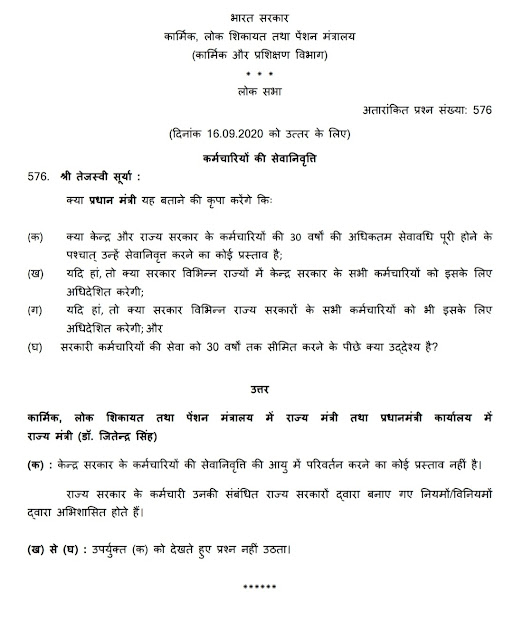Loksabha News About Retirement of employees
SynopsisThe Centre was asked whether there was a proposal to retire employees of central and state governments after completing a maximum service period of 30 years. "There is no proposal to change the age of superannuation of central government employees. The state government employees are governed by the rules/regulations framed by their respective state governments," he said in a written reply to the Lok Sabha.
New Delhi: There is no proposal to change the age of retirement of central government employees, Minister of State for Personnel Jitendra Singh said on Wednesday. "There is no proposal to change the age of superannuation of central government employees. The state government employees are governed by the rules/regulations framed by their respective state governments," he said in a written reply to the Lok Sabha. The Centre was asked whether there was a proposal to retire employees of central and state governments after completing a maximum service period of 30 years. Read More News onCentral government employeespersonnel jitendra singhthe Lok Sabhalok sabharetirement(Catch all the Business News, Breaking News Events and Latest News Updates on The Economic Times.)Also Read How to ensure smooth transition to retirementBenchmark gilt retired in 3 monthsHow to invest in mutual fund retirement plansYuvraj Singh decides to come out of retirement, writes to BCCICentre highlights protections for disabled govt employees seeking voluntary retirementCentral staffers have no shield against early retirement, says governmentAdd Comment.
There is no proposal to reduce the retirement age of employees from 60 years to 58 years, the government said on Wednesday. “No Sir. Presently, there is no proposal to reduce age of retirement on superannuation from 60 years to 58 years,” Minister of State for Personnel Jitendra Singh said in a written reply to Lok Sabha.He said there are provisions under Fundamental Rules 56(j), Rule 48 of Central Civil Services (Pension) Rules, 1972 and Rule 16 (Amended) of All India Services (Death-cum-Retirement Benefits) Rules, 1958, according to which the government has the absolute right to retire officials prematurely, on the ground of lack of integrity or ineffectiveness, in public interest, by giving notice of not less than three months in writing or three months’ pay and allowances in lieu of such notice. Such provisions can be applicable on a government employee if he is, in group ‘A’ or group ‘B’ service or post in a substantive, quasi-permanent or temporary capacity and had entered service before attaining the age of 35 years, and is over the age of 50 years, the minister said.In any other case, these rules will be applicable to the employees once they attain the age of 55 years, he said.
“Besides, the government will also consider raising the retirement age of all central government employees from the present 60 to 62 years. The decisions may be taken to achieve the aim at luring central government employees to turn voters in support of BJP,” the official added. Minister of State for Personnel Jitendra Singh had said in March that there was no plan to increase the retirement age of central government employees from existing 60 years to 62 years.
The Centre on Wednesday said it was not planning to reduce the retirement age of government employees from 60 years to 58 years. Minister of State for Personnel Jitendra Singh said this in a written response to a question asked in the Lok Sabha.The current retirement age in most services is 60 years, and 65 years for professors and doctors. Singh, however, cited rules and provisions that allow the government to force officials to retire prematurely in public interest for lacking integrity or for being ineffective.According to social media rumours that surfaced in September, the government had cleared a proposal to reduce the superannuation age of central employees from April 2020. According to the reports, employees could be retired after they complete 33 years of service or turn 60 years, whichever is earlier. However, the Centre refuted the rumours, calling them unfounded and baseless..

